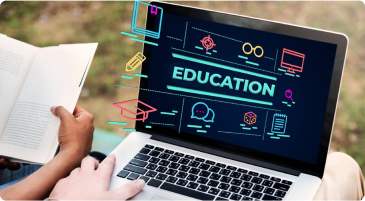
Welcome to our deep dive into the global trends reshaping the landscape of education. For aspiring educators in a Bachelor of Education (B.Ed) program, understanding these trends is crucial to becoming effective, innovative, and adaptable teachers. This blog explores key global trends in education, their impact on teaching and learning, and how future educators can prepare to meet these emerging challenges and opportunities.
Personalized learning is revolutionizing the educational landscape by shifting the focus from a one-size-fits-all approach to a more tailored educational experience that meets the unique needs of each student. This trend leverages data and technology to create customized learning pathways that accommodate different learning styles, paces, and interests.
Adaptive Learning Technologies: Tools like AI-driven software that adjust the difficulty and style of content based on student performance.
Student-Centered Approaches: Emphasizing student choice and voice in learning activities, fostering greater engagement and ownership of their education.
Educators need to develop skills in data literacy to effectively use and interpret educational technologies and platforms. Moreover, fostering a classroom environment that supports individualized learning experiences requires a flexible and adaptive teaching mindset.
Technology continues to play a pivotal role in transforming education. The integration of digital tools and resources into the classroom not only enhances learning experiences but also prepares students for a tech-savvy world.
Learning Management Systems (LMS): Platforms like Moodle and Google Classroom streamline teaching and learning processes, making it easier to deliver content, assess student progress, and provide feedback.
Interactive Digital Media: Tools such as virtual reality (VR), augmented reality (AR), and gamified learning experiences that make learning more immersive and engaging.
Future educators must be proficient in using a variety of digital tools and platforms. This includes not only understanding how to operate these technologies but also integrating them into pedagogically sound practices that enhance student learning.
In an increasingly interconnected world, global citizenship education (GCE) is essential for preparing students to navigate and contribute to a global society. GCE focuses on equipping students with the knowledge, skills, and values needed to engage effectively and ethically in a diverse and complex world.
Intercultural Understanding: Encouraging awareness and appreciation of cultural diversity and fostering empathy and respect for different perspectives.
Ethical and Responsible Action: Promoting social responsibility, sustainability, and active participation in local and global communities.
Teachers need to be culturally competent and adept at integrating global issues and perspectives into their curriculum. This involves creating opportunities for students to engage in discussions about global challenges, encouraging critical thinking, and facilitating cross-cultural exchanges.
Competency-based education (CBE) emphasizes the acquisition of specific skills and competencies over traditional seat-time requirements. This approach ensures that students achieve mastery in essential areas before moving on to more advanced topics.
Flexible Pacing: Allowing students to progress at their own pace, advancing upon demonstrating mastery of competencies.
Real-World Relevance: Aligning educational outcomes with real-world skills and competencies required in the workforce and society.
Educators need to shift their focus from traditional grading systems to formative assessments that measure student progress in mastering competencies. This requires developing new assessment tools and strategies and providing personalized support to help students achieve mastery.
Inclusive education aims to provide equitable learning opportunities for all students, regardless of their background, abilities, or learning needs. This trend emphasizes the importance of removing barriers to learning and fostering an inclusive classroom environment.
Differentiated Instruction: Tailoring teaching methods and materials to accommodate diverse learning needs.
Universal Design for Learning (UDL): Implementing flexible learning environments that can accommodate individual learning differences.
Future educators must be trained to recognize and address diverse learning needs and to create inclusive classroom environments. This involves adopting inclusive teaching practices, collaborating with specialists, and advocating for policies that support equity and access.
Social and emotional learning (SEL) focuses on the development of key skills such as self awareness, self-management, social awareness, relationship skills, and responsible decision-making. SEL is crucial for fostering a positive school climate and supporting student well-being.
Emotion Regulation: Teaching students strategies for managing their emotions and coping with stress.
Interpersonal Skills: Enhancing students' ability to communicate effectively, resolve conflicts, and build healthy relationships.
Educators play a critical role in implementing SEL programs and creating a supportive learning environment. This requires training in SEL practices, modeling positive behaviors, and integrating SEL into daily classroom activities.
The rapidly changing educational landscape requires educators to commit to lifelong learning and continuous professional development. Staying updated with the latest research, trends, and best practices is essential for maintaining teaching effectiveness and improving student outcomes.
Professional Learning Communities (PLCs): Collaborative networks where educators can share experiences, challenges, and solutions.
Online Courses and Workshops: Flexible learning opportunities that allow educators to enhance their skills and knowledge.
Future educators should cultivate a mindset of lifelong learning, seeking out opportunities for professional growth and staying engaged with the broader educational community. This proactive approach ensures that they remain responsive to the evolving needs of their students and the educational landscape.
As aspiring educators, understanding and adapting to global trends in education is crucial for preparing to meet the demands of the 21st-century classroom. By embracing personalized learning, integrating technology, fostering global citizenship, implementing competency-based education, promoting inclusion, supporting social and emotional learning, and committing to lifelong professional development, future teachers can create dynamic, inclusive, and effective learning environments.
As you embark on your journey in the B.Ed program, we encourage you to stay curious, innovative, and dedicated to the continuous improvement of your practice. Together, we can shape the future of education and empower the next generation of learners to thrive in an ever-changing world.